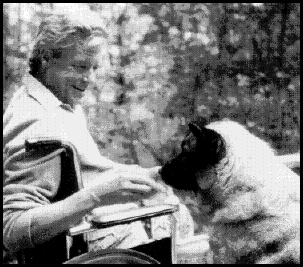(October 18, 1932 - July 13, 2004)

Gallagher had great passions. I would guess that I am not violating his privacy by revealing to you that he lived in the thrall of passion for the last thirty years of his life. I knew some of them, knew their names. Like the Iliad and the Odyssey, Richard II and Henry IV, Swan Lake and Petrushka. Tchaikovsky, Homer, Stravinsky, Herodotus, Marlowe, Shakespeare.
Especially Shakespeare. He used to complain bitterly that when he was very young his mother would read to him from Winnie the Pooh. "Why didn't she read Shakespearian sonnets to me?" he wondered. Instead of poetic tributes to the 'Noble Young Man,' and 'The Dark Lady,' it was
- The more it snows (TiddlyPom)
The more it goes (TiddlyPom)
The more it goes (TiddlyPom)
On snowing.
His special love was Tennyson, and he could recite, from memory, countless lines from "Ulysses" and "Tithonus:"
- "The woods decay, the woods decay and fall,
The vapours weep their burthen to the ground,
Man comes and tills the field and lies beneath,
And after many a summer dies the swan."
Gallagher was my buddy but sometimes I like to think that he was my twin as well. We went through so many things together: euphoric success, total breakdown, irresistible aging. We would talk on the telephone a dozen or so times a month. Our conversations would range over thoughts and acts and misdeeds and regrets and sorrows and joys and pleasures and woe.
I especially recall the weekend he found he could no longer transfer from bed to chair by himself. What some may think of as just another hitch was to him a profound tragedy for it threatened the one thing he most feared: losing the ability to be independent, to be on his own, to be free of the helping hands. He spent that particular weekend alone, in his house, grieving profoundly, grieving yet again over an irreplacable loss.
The day he discovered the extent of his illness he called up several of us. I was out, so he only got my answering machine. "Lonzo," he said --- he was the only one in the world I would ever tolerate calling me that --- "Tell Lonzo that I am dying. I'm calling people to tell them I am dying."
Ah, Hugh. No fiddling around. The doctors have told you what's going to happen and you call your friends and tell them. You do not do that for an extra jolt of love or compassion but because these are the facts. You are dying and it's common courtesy to tell those who love you.
I called him back. He told me he was "busy dying." He said that he had gotten to the "Ah-me" stage. Ah, me. Not lashing out at the gods, not immersed in self-pity, not even questioning. Just "Ah ... me."
Over the years Hugh was in terror, as most of us disabled are, that in his final years he would be forced to spend his last cent on doctors and hospitals and end up in a nursing home. In my call I said that I guessed he no longer had to worry about that. "Now you can squander," I said. "Where will you go?" He said he was going to go to St. Petersburg.
"St. Petersburg, Florida?" I said. I always figured that as the retirement home of Nurse Ratched.
"No, no," he said, "St. Petersburg, Russia. To the Hermitage Museum. I've been meaning to go for some time now. And afterwards we're going to have dinner in a pre-Czarist restaurant."
"This is the first time I've been mortally sick, Lonzo. My telephone is tired," he said, "and I'm tired too." And that was the last time I heard his voice.
On the 14th of July, I woke to the sound of a mourning dove, perched in the bay tree just outside my window --- a bird I had never heard in the many years I'd been living in this part of California.
It only stayed around for a couple of days ... and then was gone. Which made sense. I figured Hugh had other lands to visit, other suns to conquer. I saw it as an honor not only to know him for this last half-century, but to hear from him right there at the end, before he took off.
Just like Hugh, I thought. To fly down to let me know that everything was OK ... that he was on his own again. Coming back one last time to let me know that I shouldn't be fretting about him anymore.